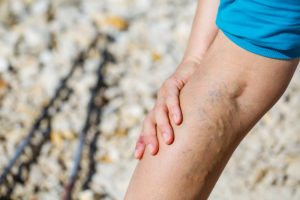Are Varicose Veins Dangerous?

Elder Care in Winchester City VA: The Causes and Treatment for Varicose Veins.
Around 23% of Americans have varicose veins, those bulging, blue veins right beneath the surface of the skin. More women than men get them and they are more common in people over 50 than in younger people. Varicose veins are unsightly, but if your parent has them, you may be wondering if they’re dangerous and if there’s anything you and your parent’s home care providers can do to help.
What Are Varicose Veins?
-Varicose veins usually show up in the feet and legs. Varicose veins may be accompanied by spider veins, the smaller blue veins caused by flooded capillaries. Rarely, veins that are deeper in the body can become varicose, too.
-Varicose veins occur when the one-way valves in the veins do not work properly. This inhibits the flow of the blood from one valve to the next and causes the blood to pool. Since veins are supported by the body’s muscles, the surface veins that have less muscle support are more likely to become varicose.
-Varicose veins can become swollen and painful and may indicate a higher chance of other kinds of circulatory problems. Complications of varicose veins include blood clots, bleeding, and ulcers.
What are the Causes of Varicose Veins?
-Excess pressure on the abdomen or legs can lead to varicose veins.
Risk factors for varicose veins are:
-Excess weight: Obesity causes excess pressure on the veins.
-Age: Varicose veins are more common in people over the age of 50. As we age, the valves in the veins degrade due to wear and tear.
-Sex: Women are more likely to get varicose veins than men.
-Standing or Sitting for a Long Time: Remaining in one position for a long time impedes circulation.
-Sedentary Lifestyle: Muscles that are not fit don’t support veins as well.
-Family History: People who have family members with varicose veins may be more likely to also get varicose veins.
What Can Be Done to Treat Varicose Veins?
Often doctors take a conservative approach to varicose veins and suggest changes to lifestyle before taking more aggressive measures. The doctor may suggest that your parent lose weight and exercise. If your parent is hesitant to exercise because they worry about injury, having a home care provider present during exercise can help ease some of those fears. A home care provider can also help your parent to lose weight by preparing healthy meals and snacks.
Compression is sometimes used to treat varicose veins. The doctor may advise your parent to wear compression socks or stocking that work by increasing the pressure on the legs. The increased pressure helps blood flow toward the house more easily and can also reduce swelling. Compression socks can be difficult to put on, but a home care provider can help your parent to wear them as prescribed by the doctor.
If you or an aging loved-one are considering elder care in Winchester City, VA, please contact the caring staff at LivinRite Home Care.
Call Us Today at (703) 634-9991.
Serving Northern Virginia, The Valley, and Surrounding Communities.
Sources:
http://www.mayoclinic.org/diseases-conditions/varicose-veins/home/ovc-20178078
http://www.healthline.com/health/varicose-veins
http://www.webmd.com/skin-problems-and-treatments/understanding-varicose-veins-basics
http://www.mayoclinic.org/diseases-conditions/varicose-veins/symptoms-causes/dxc-20178128
- Skilled Nursing: Offering Peace of Mind for Seniors Aging in Place - April 8, 2025
- Can Physical Therapy Help Seniors Learn How to Fall Safely? - March 27, 2025
- Senior Home Care Helps Keep Aging Adults Safe in the Kitchen - March 11, 2025
